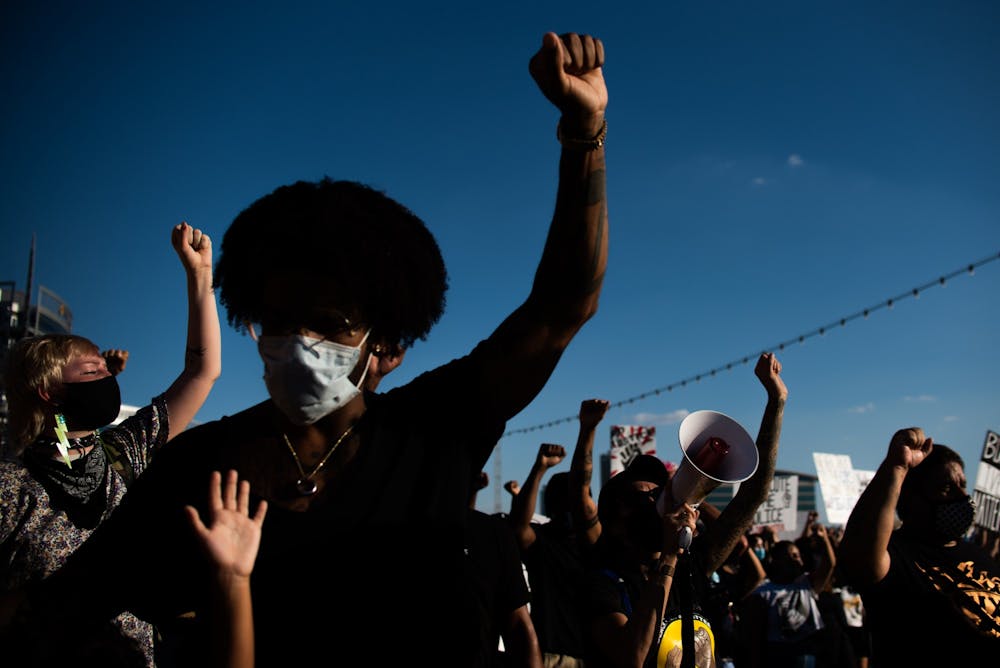ASU has announced an update on the University's plan to advance racial equality and inclusivity on campus, which was renamed the LIFT Initiative.
"As African Americans, we sing it proudly: My parents taught me the words to that song, I taught my daughter," Jennings-Roggensack said. "It's a song about struggle, but that together we can make a difference, and we have to hold true to it."
A series of endeavors has been undertaken since the project's announcement in September of last year, like establishing the Advisory Council on African American Affairs.
Others include The Difference Engine: An ASU Center for the Future of Equality, an interdisciplinary project targeting inequalities across the U.S., which Crow mentioned in his statement.
Plans are in place to establish the highly requested and University's first multicultural center, which Jennings-Roggensack said will not just be about "a building, a structure, a floor or an office," but rather, will focus on "what's going to be the content inside and how it will support all BIPOC undergraduate and graduate students."
READ MORE: USG presidents focus on Multicultural Centers, pandemic-related initiatives
The University is also working closely with ASU Police Chief Michael Thompson to reevaluate the role of campus police, Jennings-Roggensack said, addressing a demand central to various protests last year.
She said the University is looking into using mental health professionals rather than police officers in specific situations where their skills would be more effective.
"There's a national movement afoot where all university and all campus securities are being reimagined," Jennings-Roggensack said, adding that in some cases, "our police are being asked to do work where it might be better to have a mental health professional."
LIFT also focuses on equitable hiring practices and staff retention by increasing the number of tenured Black faculty, conducting workplace environment studies and establishing mentorship programs for faculty and staff.
Research into racial discrimination at ASU has begun under the newly established Faculty Inclusion Research for System Transformation, directed by associate dean of faculty development and law professor at Sandra Day O’Connor College, Victoria Sahani.
Jennings-Roggensack said the plans were made not just by looking at the item to accomplish, but by also examining "the systemic root of it, possible solutions, what action to take, what data supports that action and who's accountable."
"It's one thing just to say, we're going to add more postdocs, but why is it we don't have enough Black postdocs or in some areas, we don't have African American postdocs," Jennings-Roggensack said.
Much of the work under the LIFT Initiative is done through the help of the Justice, Equity, Diversity, and Inclusion, or JEDI, committees across ASU's campuses.
Associate Dean of Barrett, The Honors College Downtown and founder of the school's JEDI task force, Olga Davis, said the creation of the task force was prefaced by the racial reckoning of 2020.
"We created the JEDI force within Barrett and that's really to highlight support and to be in solidarity with Black Lives Matter," Davis said.
The task force is divided "to address curricular issues, academic issues, retention, recruitment, partnerships and advocacy," Davis said.
"I was so happy and proud to be at a place where the leader, the president of the University, took a stand and said, 'enough is enough,'" Davis said. "We are making very real, concretized changes."
The work under LIFT will be recounted in a public report shared with Crow, the Arizona Board of Regents and local business leaders to encourage the creation of similar initiatives in the community. Journalist and ASU alumna Michelle Fitzhugh-Craig will author the report.
"We truly believe that the work we are doing underscores ASU's charter of being measured by whom we include, not whom we exclude and the success of those we include," Jennings-Roggensack said. "And this, the betterment of African American faculty, staff and students, will be the betterment of ASU."
Reach the reporter at sreyes23@asu.edu and follow @r_salma_ on Twitter.
Like The State Press on Facebook and follow @statepress on Twitter.
Continue supporting student journalism and donate to The State Press today.
Continue supporting student journalism and
donate to The State Press today.




